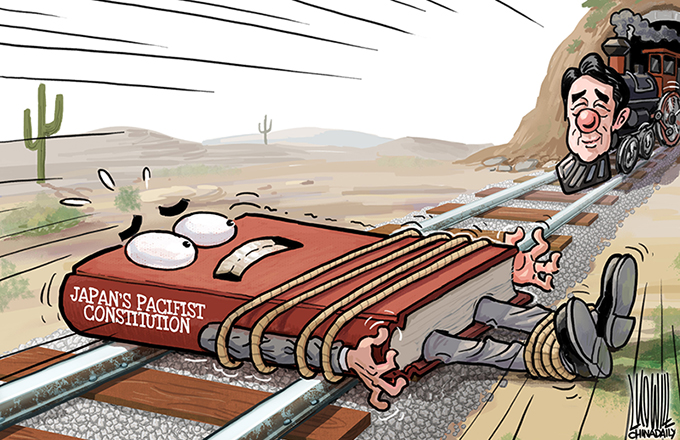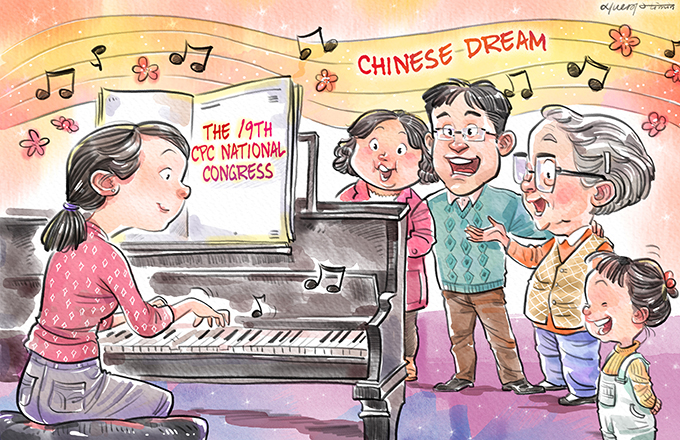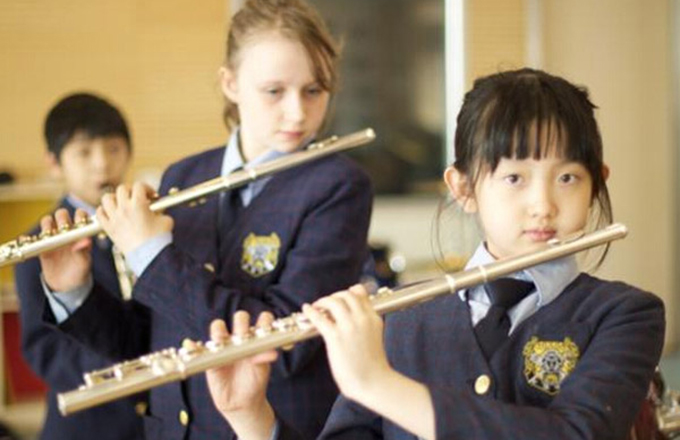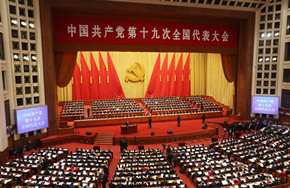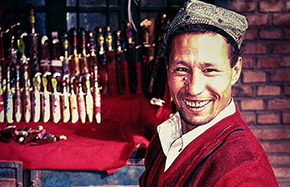HK benefits from growth of motherland
 |
|
The Hong Kong-Zhuhai-Macao Bridge under construction. [File photo/CHINA DAILY] |
It is imperative to fully and faithfully implement the policies of "one country, two systems", "the people of Hong Kong governing Hong Kong" and "the people of Macao governing Macao", and a high degree of autonomy for both regions,
General Secretary Xi Jinping said in his report to the 19th National Congress of the Communist Party of China on Oct 18. It is imperative, too, that people in the two special administrative regions strictly comply with China's Constitution and the basic laws of their respective regions.
Xi emphasized "fully and faithfully" implementing the policies because there are some misunderstandings of the principle of "one country, two systems" in the Hong Kong Special Administrative Region. Some Hong Kong residents are trying to deny the central government's overall jurisdiction over the SAR and the fact that the country's Constitution and the Hong Kong Basic Law both form the constitutional basis of Hong Kong. Some Hong Kong residents are even unwilling to accept the political relationship between the central government and the SAR.
As a basic national policy, the principle of "one country, two systems" will not change, because its fundamental purpose is to safeguard national sovereignty, security and interest, as well as maintain Hong Kong's long-term stability and prosperity.
The goal of the principle of "one country, two systems" is to achieve national unity. The "two systems" governance pattern is a feasible and wise choice to not only achieve the great strategic goal of national unity but also maintain the long-term prosperity and stability of the regions.
The grand strategy of national unity determines that "one country" is the premise and basis of the "two systems", and the "two systems" reflects the country's inclusiveness, political confidence and flexibility.
The Hong Kong Basic Law is a constitutional legal document for the region, but cannot be compared with the country's Constitution. Some SAR residents claim the Basic Law is the region's "constitution", which shows they are either ignorant of the national system or are trying to deny the status of China's Constitution.
As a centralized unitary state, China has only one Constitution, which is the mother law of the Hong Kong Basic Law. The political and legal relationship between China's Constitution and the SAR's Basic Law shows the central government has overall jurisdiction over Hong Kong.
Given the political issues facing Hong Kong since its return to the motherland, especially the disputes on universal suffrage and the serious misunderstanding of the "one country, two systems" principle, the State Council Information Office released a white paper on the implementation of "one country, two systems" in Hong Kong on June 10, 2014. The white paper reaffirmed the central government's overall jurisdiction over Hong Kong, saying the election of Hong Kong chief executive and Legislative Council by universal suffrage should be in accordance with national sovereignty, security and interests as well as the SAR's actual conditions. And on Aug 31, 2014, the Standing Committee of the National People's Congress' decision, among other things, corroborated the white paper.
Still, the pro-democracy camp in Hong Kong launched the "Occupy Central" protest. The Mong Kok riots occurred in 2016 with some people even advocating "Hong Kong independence" after Hong Kong's political reform plan was vetoed. The NPC Standing Committee interpreted the Hong Kong Basic Law, and the SAR judiciary authorities handed down appropriate punishments to those indulging in politically extreme actions and thus purified Hong Kong's political atmosphere.
"One country, two systems" is a long-term cause. Improving people's livelihoods will be the principal task of Hong Kong in the future. So Hong Kong should better integrate into the overall development of the country. More important, Hong Kong's constitutional development, including democratic politics, should proceed legally and orderly under the guidance of the central government.
The author is a professor at Shenzhen University and a member of the Chinese Association of Hong Kong and Macao Studies.
- Hong Kong, Macao possess unique advantages in national development: HK financial secretary
- Hong Kong to step up efforts to tackle manpower shortage problem
- Seminar promotes Hong Kong advantages for Canada
- Hong Kong to launch new profits tax system next year
- Xi's report paints a bright future for Hong Kong
- New air route opens between Hong Kong, Zhangjiajie



